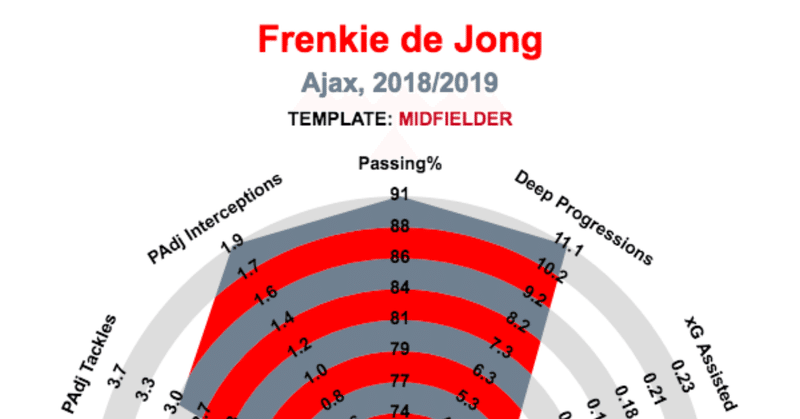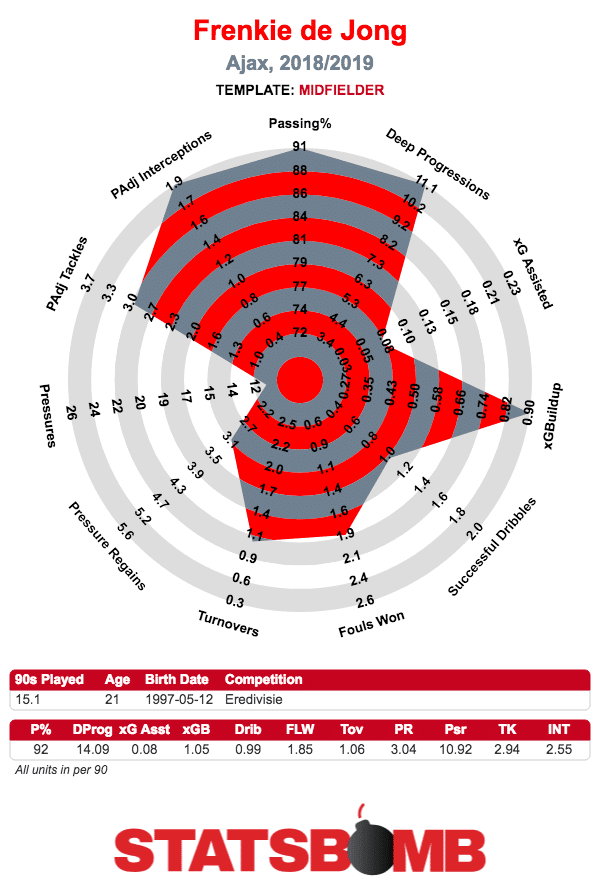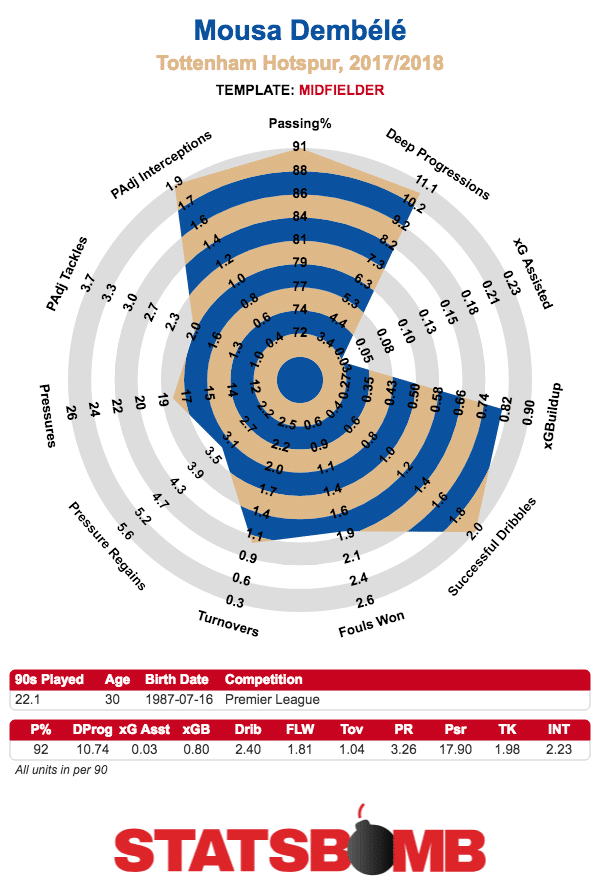
フットボール統計学 プレッシング耐性を持つミッドフィールダーの台頭(前編)
January 29, 2019 - The Rise of Press-Resistant Midfielders - By Grace Robertson
If you asked football fans in the early years of this decade about the best midfielders in the world, the names you would most likely hear were Xavi, Andrés Iniesta and Andrea Pirlo. Xabi Alonso and Paul Scholes might not be too far behind.
この10年の初めに世界で最高のMFについてフットボールファンに尋ねたならば、シャビ、アンドレス・イニエスタ、そしてアンドレア・ピルロだろう。シャビ・アロンソとポール・スコールズはそれほど遅れていないかもしれない。
What’s striking is just how associated they are with one specific attribute: passing. Xavi’s short passes in the middle third of the pitch were of such quality that, as his former manager Pep Guardiola described it, “he couldn’t lose the ball”. Pirlo turned the floated ball into the final third into an art form, while Alonso and Scholes (at least later in his career) excelled at the crossfield pass. Iniesta had a slightly different game, being a better dribbler and “changing the pace”, as Guardiola put it, but only in comparison to teammate Xavi would one claim that he was not a passing-focused player.
注目に値するのは、それらが1つの特定の属性、つまりパスとどのように関連しているかである。元指揮官ペップ・グアルディオラが「彼はボールを失わなかった」と述べたように、シャビのミドルサードでのショートパスは非常に質の高いものだった。ピルロは芸術的な形で浮遊したボールをファイナルサードに送り、一方アロンソとショールズ(少なくとも彼のキャリアの中で後期)はクロスフィールドパスで優れていた。グアルディオラが言っているように、イニエスタはドリブルやペースを変える選手で少し違うゲームをしていたが、チームメイトのシャビと比較して初めて、彼はパスを重視する選手ではなかったと主張するだろう。
And as for today? There are still practitioners of the passing midfield game, but often with asterisks attached. Manchester City’s Kevin De Bruyne is certainly one of the most gifted passers around, but in a different way to previous Guardiola stars. “He is not a controller”, the Catalan manager claimed, but is instead “more dynamic, coming from behind, finishing, crossing, appearing here, then there, defending, attacking… less control and much more movement”. Fellow City midfielders David and Bernardo Silva are also wonderful technicians, but end up taking such advanced positions at times that there is a question over whether they should even be in this category.
そして今日はどうか。中盤のパスゲームの専門家はまだいるが、アスタリスクが付いていることがよくある。マンチェスター・シティのケヴィン・デ・ブライネは、確かに最も才能のあるパサーの1人だが、それは以前のグアルディオラのスターとは異なる方法である。「彼はコントローラーではない」とカタルーニャの指揮官は主張したが、代わりに「もっとダイナミックで、後ろから来て、フィニッシュして、クロスして、ここに現れて、そこに来て、守って、攻撃して…コントロールは少なく、もっと動きがある」と主張した。同僚のシティのMF、ダビド・シルバとベルナルド・シルバも素晴らしいテクニシャンだが、時には高い位置を取ることになるので、彼らがこのカテゴリーに入るべきかどうかについて疑問がある。
The reigning Ballon d’Or winner Luka Modrić is a controller, but he does this through his dribbling ability and deceptively good work ethic without the ball as well as his superb passing talent. The most expensive midfielder in the world, Paul Pogba, also has a controlling passing range, but has such a wide range of skills that one could ask him to play any number of midfield roles. N’Golo Kanté, the only central midfielder to be named PFA Player of the Year in the past decade, is a great player for hugely different reasons. Perhaps only Toni Kroos fits the previous mould of passing controllers while sitting among the best midfielders in the world.
現在のバロンドールの勝者ルカ・モドリッチはコントローラーだが、彼は優れたパス能力だけではなく、ドリブル能力やボール無しでの巧妙な倫理を通してコントロールする。世界で最も高価なMFであるポール・ポグバも、コントロールするパスレンジを持つが、そのような幅広いスキルを持っているので、彼にはいくつもの中盤の役割を果たすよう依頼できる。過去10年間でPFA年間最優秀選手賞に選ばれた唯一のセンターMFであるエンゴロ・カンテは、非常に異なる理由から素晴らしい選手である。恐らくトニ・クロースだけが、世界で最高のMFの中でパスによるコントロールの前の型に合う。
Looking ahead, Barcelona have just signed Frenkie de Jong to be the planned centrepiece of their midfield for the next decade. As Ryan O’Hanlon has noted at The Ringer, he is the future. What O’Hanlon means is that the game is becoming “much more frenetic”, and what is now needed is to “‘break the lines’ — i.e. dribble or pass through a band of attackers, a band of midfielders, and a band of defenders”, which De Jong does through “bombing dribbles and seam-splitting passes”. This marks a sharp contrast from the slower controlling passers we saw earlier in the decade. If Frenkie is the future, then Pirlo is the past.
将来を見据えて、バルセロナはフレンキー・デ・ヨングと契約し、次の10年間で中盤の中心的存在となる予定である。Ryan O’Hanlon氏がThe Ringerで指摘したように、彼は未来である。O'Hanlon氏が意味するのは、ゲームが「ずっとより熱狂的」になりつつあるということで、そして今必要とされているのは「ラインを破る」、つまりFWの帯/鎖(1列目)、MFの帯(2列目)、そしてDFの帯(3列目、最終ライン)をドリブルやパスで通過することであり、デ・ヨングは「ドリブルの爆撃と継ぎ目を分割するパス」で行っている。これは我々が10年ほど前に見た遅いコントロールパサーとははっきりとした対照を示す。もしフレンキーが未来なら、ピルロは過去である。

Defense against the passing arts
芸術的なパスに対する守備
In terms of how we got here, we have to look at clearly the most tactically significant side of the last decade: Guardiola’s Barcelona. In case you’ve been living under a rock, Guardiola’s team blended a possession focused, short passing style with the ball, hence the great emphasis on the “passing midfielders”, with an aggressive high press without it. Initially, the only tactical response teams had to this was to defend very deep and exploit space on the counter, done most famously by José Mourinho’s teams as well a Chelsea side looking to imitate the Portuguese manager’s approach with a number of his former players. Thus the view held by many at the time was that sides facing Barcelona must either sacrifice all ideas of good football and scrap with eleven men behind the ball for 90 minutes, or attempt to play their own game and suffer a noble defeat.
ここに着いた方法の観点から、明らかに過去十年間の最も戦術的に重要な側面を見なければならない。グアルディオラのバルセロナである。グアルディオラのチームはポゼッションに焦点を当て、ショートパススタイルを組み合わせ、それゆえパサーのMFを重視しており、ボールを持っていない時には積極的なハイプレッシングを行った。当初、これに対する唯一の戦術的対応は、非常に深い位置で守備し、カウンターでのスペースを活用することであり、ジョゼ・モウリーニョのチームと、チェルシー側がポルトガル人監督のアプローチを彼の元選手の数人で模倣しようとしていることで最も有名になった。従って、当時多くが支持してきた見解は、バルセロナに対しているチームは良いアイデアをすべて犠牲にし、ボールの後ろに11人を連れて90分間スクラップしなければならないというものか、または自分のゲームをプレーして高貴な敗北をするかだった。
The first side to make a serious attempt to nullify Barcelona in a different way was in November 2011, when then Athletic Bilbao manager and high pressing advocate Marcelo Bielsa welcomed Guardiola’s men to the San Mamés stadium. Barcelona started the game with four passing midfielders: Xavi, Iniesta, Sergio Busquets, and Cesc Fàbregas, nominally playing the striker role. Athletic responded by not merely pressing high, but by doing so through two phases. As Michael Cox noted at the time, Bielsa instructed his players to “ Barcelona high up the pitch at goal-kicks and forced Víctor Valdés to kick the ball long” in the final third, while across the rest of the pitch in open play, the team played an outright man marking job.
バルセロナを別の方法で無効にしようとする最初のチームは、2011年11月のことであり、当時アスレチック・ビルバオの指揮官でありハイプレッシングの支持者であるマルセロ・ビエルサは、グアルディオラの選手をサン・マメス・スタジアムに迎え入れた。バルセロナは4人のパサーのMFで開始した。シャビ、イニエスタ、セルヒオ・ブスケツ、および名目上ストライカーの役割を果たしたセスク・ファブレガスである。アスレチックは単にハイプレッシングによってではなく、2局面を通してそうすることによって答えた。
Michael Cox氏がその時に指摘したように、ビエルサはファイナルサードでバルセロナがゴールキックの時高い位置に選手を上げてビクトル・バルデスにロングキックを強いた一方、オープンプレー中、ピッチの残りの部分ではチームは完全なマンマークをした。
The strategy worked: not just were Athletic able to get a point against the best side ever to play football, but perhaps more symbolically, Xavi, the purest embodiment of the passing controller in midfield and typically the heartbeat of that Barcelona side’s build-up play, was taken off after 60 minutes for the much more direct Alexis Sánchez. Watching the game back all these years later, one of the most notable features is how hard Barcelona found it to move the ball forward through central areas. So often, Athletic were able to shut off Barcelona’s passing options. Bielsa had shown that, while Barcelona were great pressers themselves, they were not invulnerable to being pressed by opponents. Though the level of execution required was extremely high, a midfield heavily focused on passing could be pressed into submission.
戦略はうまくいった。アスレチックがフットボールをするのに史上最高のチームに対して勝ち点を得ることができただけでなく、おそらくもっと象徴的に、中盤のパスコントローラーの最も純粋な具現化、そして典型的にそのバルセロナのビルドアップの心臓であるシャビは、はるかに直接的なアレクシス・サンチェスに、60分で交代した。何年も後に試合を振り返ってみると、最も注目すべき機能の1つは、バルセロナが中央からボールを先に進めるのがいかに難しいかを発見したことである。それほど頻繁に、アスレチックはバルセロナのパスの選択肢を遮断することができた。ビエルサ氏は、バルセロナはプレッシングに優れていたが、彼らは相手にプレッシングされることに対して不死身ではなかったことを示した。要求される実行のレベルは非常に高かったが、パスに重点を置いた中盤は提出を急がれる可能性がある。
La Liga was not the only league where pressing was becoming en vogue, of course. Over in Germany, “gegenpressing” (literally “counter pressing”, referring to pressing most aggressively in situations immediately after the ball has been lost) was taking the nation by storm, popularised by Ralf Rangnick and reaching dominance when Jürgen Klopp’s Borussia Dortmund won the Bundesliga title playing this way. This style involved some of the same principles as that advocated by Guardiola and Bielsa, but created something distinct. The emphasis is on not pressing constantly but in specific moments, the primary purpose being not to regain possession but rather to attack in fast transitions.
もちろん、ラ・リーガはプレッシングが流行している唯一のリーグではなかった。ドイツでは、ゲーゲンプレッシング(文字通りカウンタープレッシング、ボールロスト直後の状況で最も積極的にプレスすることを指す)がラルフ・ラングニックによって普及し、ユルゲン・クロップのボルシア・ドルトムントがブンデスリーガのタイトルをこの方法で獲得して、優位性を獲得できた。このスタイルには、グアルディオラやビエルサによって提唱されているものと同じ原則がいくつか含まれていたが、明確なものがあった。重点は絶えず押しているのではなく、特定の瞬間に、主な目的はポゼッションを取り戻すことではなく、むしろ速いトランジションで攻撃することである。
“The best moment to conquer the ball is right after your own loss”, explained Klopp in 2012. “The opponent must first orient himself, look where he could play the ball. And pow, you’re already there”. The first thing this means is that the tempo of the attacking play is higher, meaning that a passing controller is often not just unnecessary but a detriment to the side, forcing the team to slow the game down. It also can cause significant problem for passing controllers on the opposing team. With the gegenpressing side easily able to press aggressively in the midfield, there can be a similar effect to what Bielsa achieved against Barcelona (albeit executed slightly differently), with the midfielder’s passing options shut off and the game played at a tempo difficult to dictate in.
「ボールを征服するのに最適な瞬間は、自分のボールロストの直後である」と、2012年にKloppは説明した。「相手はまず自分の向きを決め、ボールをプレーできる場所を見なければならない。 そして、もうそこにいる。」これが意味する最初のことは、攻撃するプレーのテンポがより高いことで、パスするコントローラーが単に不必要なだけではなく、チームに悪影響を及ぼし、ゲームのスピードを落とさせることを意味する。また、相手のパスコントローラーに大きな問題を引き起こす可能性がある。
ゲーゲンプレッシング側が簡単に中盤で積極的にプレッシングできると、ビエルサがバルセロナに対して達成したのと同様の効果があるかもしれず(ただし実行方法が若干異なる)、中盤のパスの選択肢は切られ、ゲームは指示されにくいテンポでプレーされる。
It’s notable that one of the few advocates of possession football in the Bundesliga during the rise of gegenpressing, Louis van Gaal at Bayern, struggled against Klopp’s Dortmund. In the last contest between the two in Germany, Dortmund were very fast to close down passing controller Bastian Schweinsteiger, forcing him to drop deeper and deeper and making him unable to influence the game. Klopp’s side won the game 3-1, and this style of football was on its way to dominance.
注目すべきは、ゲーゲンプレッシングの台頭の間に、ブンデスリーガでポゼッションフットボールの支持者の一人、バイエルンのルイ・ファン・ハールがクロップのドルトムントと戦ったことである。ドイツの2人の間の最後の試合では、ドルトムントはパスコントローラーのバスティアン・シュヴァインシュタイガーを非常に速く閉じ、低い位置に降りさせ、試合への影響を消した。クロップ側は試合に3-1で勝利し、そしてこのスタイルのフットボールは優位に向かっていた。
Press resistance is not futile
プレッシング耐性は未来ではない
If the passing controller was no longer the best ticket to success, alternate strategies had to be developed. It was something that Pep Guardiola spent a long time trying to solve at Bayern, as he still wanted to build his midfield around Alonso. The now famous tactic of having full backs move inside to become additional central midfielders was certainly a part of this, lessening the load for Alonso while their flexible hybrid positions made them more difficult to press.
パスコントローラーが最善の成功の秘訣ではなくなった場合、代わりの戦略を立てる必要があった。グアルディオラがバイエルンで解決しようと長い時間を費やしたことは、まだ彼がシャビ・アロンソの周りに中盤を築くことを望んでいたためだった。サイドDFを中央のMFにするために中に入ったという今や有名な作戦は確かにこれの一部であり、柔軟なハイブリッドポジションのためにアロンソの負荷を軽減することは、プレッシングをより困難にした。
But there was also a sense of a new view on the midfield role when he signed Arturo Vidal, a much more energetic, physical player than one could ever imagine his Barcelona side fielding (that Vidal himself now plays at the Camp Nou is an irony surely not lost on anyone, with even the spiritual home of passing football adjusting). Now at Manchester City, Guardiola doesn’t even play with a passing controller at all, with Fernandinho a more defensively focused holding player whose passing skills in transition allow those in front of him to move into attacking roles more frequently.
しかし、彼のバルセロナを想像するよりもはるかにエネルギッシュでフィジカルな選手であるアルトゥーロ・ビダルとサインしたとき、中盤の役割についての新しい見解の感覚もあった(ビダル自身が現在カンプノウでプレーしているのは、誰もが失うことのない皮肉なことで、パスフットボールの精神的な家でさえも調整されている)。現在マンチェスター・シティでは、グアルディオラはパスコントローラーを起用しておらず、フェルナンジーニョはより守備的で底に位置し、トランジションのパススキルは、彼の前にいる選手がより頻繁に攻撃的な役割に入ることを可能にする。
Elsewhere, a new kind of midfielder emerged, one who could move the ball through midfield while being able to withstand the pressure. The obvious player who typifies this is Mousa Dembélé. Starting his career in his native Belgium and really emerging in the Netherlands at Van Gaal’s AZ Alkmaar, the first part of his career was in an advanced role. His most notable skill is being able to dribble under pressure without losing the ball, and at that time, the areas of the pitch where one dribbles were out wide or in the final third. For a possession football advocate in this era, even one as tactically astute as Van Gaal, central midfield was not where you used Dembélé’s skillset.
それ以外の場所では、新しい種類のMFが登場した。これを代表する明らかな選手はムサ・デンベレである。彼の母国ベルギーでのキャリアをスタートさせ、実際にファン・ハールのAZアルクマールでオランダに現れたとき、彼のキャリアの初期はより高い位置での役割を果たしていた。彼の最も注目すべきスキルはボールを失うことなくプレッシング下でドリブルできること、そしてその時にドリブルするエリアはワイドな位置、またはファイナルサードにある。現時点でのポゼッションフットボールの提唱者にとってファン・ハールのように戦術的に繊細なものであったとしても、中央MFはデンベレのスキルを使用する場所ではなかった。
After being used to mixed effect by various managers in England, Dembélé’s career hit another gear under Mauricio Pochettino. After having problems with the double pivot of Nabil Bentaleb and Ryan Mason in the Argentine’s first season in charge, Dembélé took up a starting role in midfield alongside Eric Dier and became an integral piece in the side. Dembélé in this role defined press-resistance. It became nearly impossible to win the ball from him, so comfortable was he at shirking attempts to challenge him, maintaining calm at all times under pressure. His combination of technique and physical attributes made him perhaps essentially impossible to press out of the game in his peak years.
イングランドで様々な指揮官によって混合効果に慣れていた後、デンベレのキャリアはマウリシオ・ポチェッティーノの下で次のギアに上がった。アルゼンチン人の最初のシーズンでナビル・ベンタレブとライアン・メイソンの2CMFに問題を抱えた後、デンベレはエリック・ダイアーと共に中盤でスターティングメンバーの役割を担い、チームで不可欠なピースとなった。この役目を担うデンベレは、プレッシング耐性を定義した。彼からボールを奪取するのはほぼ不可能になったので、プレッシングを受けても快適で、いつでも冷静さを保てる。彼のテクニックと身体的特性の組み合わせにより、彼はピークシーズンにはゲームから押し出されることがほぼ不可能になった可能性がある。
He evoked Guardiola’s claim that Xavi “couldn’t lose the ball”, but in an entirely different way. While inferior in other ways, it’s hard to imagine Bielsa’s Athletic side pressing Dembélé out of the game. The controller was reborn, now as a player who could dictate the game by withstanding opposition pressure and moving the ball forward nonetheless.
彼はシャビが「ボールを失うことがなかった」というグアルディオラの主張を呼び起こしたが、まったく別の方法でである。他の点では劣っているが、ビエルサのアスレチックがデンベレをゲームの外に押し出したとは想像し難い。それでも、相手のプレッシングに耐えてボールを前進させることで、ゲームを支配できた選手として、コントローラーは生まれ変わった。

ここから先は
¥ 100
#フットボール統計学
